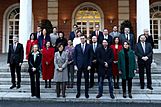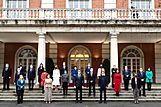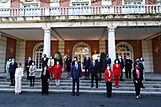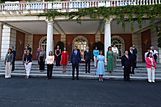Second government of Pedro Sánchez facts for kids
Quick facts for kids 2nd government of Pedro Sánchez |
|
|---|---|
Government of Spain |
|
| 2020–present | |
|
The government in January 2020 (top left), February 2021 (top right), April 2021 (bottom left) and July 2021 (bottom right).
|
|
| Date formed | 13 January 2020 |
| People and organisations | |
| Monarch | Felipe VI |
| Prime Minister | Pedro Sánchez |
| Deputy Prime Ministers | Carmen Calvo1st, Pablo Iglesias2nd, Nadia Calviño3rd, Teresa Ribera4th (2020–2021) Carmen Calvo1st, Nadia Calviño2nd, Yolanda Díaz3rd, Teresa Ribera4th (2021) Nadia Calviño1st, Yolanda Díaz2nd, Teresa Ribera3rd (2021–present) |
| No. of ministers | 22 |
| Total no. of members | 33 |
| Member parties | PSOE UP–ECP–GeC |
| Status in legislature | Minority coalition government |
| Opposition party | PP |
| Opposition leader | Pablo Casado (2020–2022) Alberto Núñez Feijóo (2022–present) |
| History | |
| Election(s) | November 2019 general election |
| Legislature term(s) | 14th Cortes Generales |
| Budget(s) | 2021, 2022, 2023 |
| Incoming formation | 2019–2020 government formation |
| Predecessor | Sánchez I |
The second government of Pedro Sánchez started on January 13, 2020. This happened after he was chosen as the Prime Minister of Spain by the Congress of Deputies on January 7. He officially took his oath on January 8. His party, the Spanish Socialist Workers' Party (PSOE), won the most votes in the November 2019 general election. This government followed his first one. It has been in charge since January 13, 2020.
This government is made up of members from the PSOE and Unidas Podemos. Unidas Podemos includes parties like Podemos, United Left (IU), the Communist Party of Spain (PCE), and En Comú Podem (ECP). There are also some independent members chosen by both parties. This was the first time Spain had a national coalition government since the Second Spanish Republic. People sometimes call it the "progressive coalition."
With 22 ministries, this government is one of the largest in Spain since it became a democracy. Only the third Súarez government was bigger. It was also the first time a government had four deputy prime ministers. When it started, the average age of its members was 54.2 years. After some changes in July 2021, the average age dropped to 50. Also, more women were in ministerial roles, making up 63.6% (14 out of 22).
Contents
How the Government Was Formed
To form a government, the Prime Minister needs to be approved by the Congress of Deputies. This process is called an investiture vote. Pedro Sánchez needed to get enough votes to become Prime Minister.
First Vote: January 5, 2020
The first vote happened on January 5, 2020. To win, Pedro Sánchez needed a special majority. This meant he needed 176 out of 350 votes. He did not get enough votes in this first try.
Second Vote: January 7, 2020
The second vote took place on January 7, 2020. For this vote, he only needed a simple majority. This means he needed more "Yes" votes than "No" votes. He successfully won this vote and became Prime Minister.
| Investiture Pedro Sánchez (PSOE) |
|||
| Ballot → | 5 January 2020 | 7 January 2020 | |
|---|---|---|---|
| Required majority → | 176 out of 350 |
Simple |
|
|
166 / 350
|
167 / 350
|
||
|
No
|
165 / 350
|
165 / 350
|
|
|
Abstentions
• ERC (13)
• EH Bildu (5) |
18 / 350
|
18 / 350
|
|
|
Absentees
• UP–ECP–GeC (1) (on 5 Jan)
|
1 / 350
|
0 / 350
|
|
| Sources | |||
Changes in the Government Team
Pedro Sánchez's government saw several changes in its ministers over time. These changes are called cabinet reshuffles.
Early Changes in 2021
- On December 30, 2020, Salvador Illa left his role as Minister of Health. He wanted to run for a new position in Catalonia. Carolina Darias, who was the Minister of Territorial Policy, took his place. She knew a lot about managing the COVID-19 pandemic. Miquel Iceta then became the new Minister of Territorial Policy.
- On March 10, 2021, Pablo Iglesias, a Deputy Prime Minister, announced he would leave his job. He decided to run in a regional election in Madrid. He suggested Yolanda Díaz, the Minister of Labour, should take over his leadership role. Ione Belarra replaced him as Minister of Social Rights. Yolanda Díaz also became the new Third Deputy Prime Minister. Nadia Calviño moved up to become the Second Deputy Prime Minister.
Big Changes in July 2021
On July 10, 2021, Pedro Sánchez made many big changes to his government. Seven ministers were replaced by new people.
- Carmen Calvo (First Deputy Prime Minister and Presidency Minister)
- Arancha González Laya (Foreign Affairs Minister)
- Juan Carlos Campo (Justice Minister)
- José Luis Ábalos (Transport Minister)
- Isabel Celaá (Education Minister)
- José Manuel Rodríguez Uribes (Culture Minister)
- Pedro Duque (Science Minister)
Also, the Finance and Territorial Policy ministries changed their structures. The role of the Fourth Deputy Prime Minister was removed. The remaining three deputy prime ministers, Nadia Calviño, Yolanda Díaz, and Teresa Ribera, were promoted. These changes officially started on July 12.
Later Changes in 2021 and 2023
- On December 16, 2021, Manuel Castells resigned as Minister of Universities due to health reasons. Joan Subirats took his place on December 20.
- In November 2022, Reyes Maroto (Industry Minister) and Carolina Darias (Health Minister) decided to run for mayor in Madrid and Las Palmas. They were replaced by Héctor Gómez and José Miñones on March 28, 2023.
Ministers in the Government
The government is led by the Prime Minister. It also includes several Deputy Prime Ministers and 22 ministries. There is also a Spokesperson of the Government. After July 2021, the government had only three deputy prime ministers.
| ← Sánchez II Government → (13 January 2020 – present) |
||||||
| Portfolio | Name | Party | Took office | Left office | Ref. | |
|---|---|---|---|---|---|---|
| Prime Minister | Pedro Sánchez | PSOE | 8 January 2020 | Incumbent | ||
| First Deputy Prime Minister Minister of the Presidency, Relations with the Cortes and Democratic Memory |
Carmen Calvo | PSOE | 13 January 2020 | 12 July 2021 | ||
| Second Deputy Prime Minister Minister of Social Rights and 2030 Agenda |
Pablo Iglesias | Podemos | 13 January 2020 | 31 March 2021 | ||
| Third Deputy Prime Minister Minister of Economic Affairs and Digital Transformation |
Nadia Calviño | Independent | 13 January 2020 | 31 March 2021 | ||
| Fourth Deputy Prime Minister Minister for the Ecological Transition and the Demographic Challenge |
Teresa Ribera | PSOE | 13 January 2020 | 12 July 2021 | ||
| Minister of Foreign Affairs, European Union and Cooperation | Arancha González Laya | Independent | 13 January 2020 | 12 July 2021 | ||
| Minister of Justice | Juan Carlos Campo | Independent | 13 January 2020 | 12 July 2021 | ||
| Minister of Defence | Margarita Robles | Independent | 13 January 2020 | Incumbent | ||
| Minister of Finance Spokesperson of the Government |
María Jesús Montero | PSOE | 13 January 2020 | 12 July 2021 | ||
| Minister of the Interior | Fernando Grande-Marlaska | Independent | 13 January 2020 | Incumbent | ||
| Minister of Transport, Mobility and Urban Agenda | José Luis Ábalos | PSOE | 13 January 2020 | 12 July 2021 | ||
| Minister of Education and Vocational Training | Isabel Celaá | PSOE | 13 January 2020 | 12 July 2021 | ||
| Minister of Labour and Social Economy | Yolanda Díaz | PCE | 13 January 2020 | Incumbent | ||
| Minister of Industry, Trade and Tourism | Reyes Maroto | PSOE | 13 January 2020 | 28 March 2023 | ||
| Minister of Agriculture, Fisheries and Food | Luis Planas | PSOE | 13 January 2020 | Incumbent | ||
| Minister of Territorial Policy and Civil Service | Carolina Darias | PSOE | 13 January 2020 | 27 January 2021 | ||
| Minister of Culture and Sports | José Manuel Rodríguez Uribes | PSOE | 13 January 2020 | 12 July 2021 | ||
| Minister of Health | Salvador Illa | PSC–PSOE | 13 January 2020 | 27 January 2021 | ||
| Minister of Science and Innovation | Pedro Duque | Independent | 13 January 2020 | 12 July 2021 | ||
| Minister of Equality | Irene Montero | Podemos | 13 January 2020 | Incumbent | ||
| Minister of Consumer Affairs | Alberto Garzón | IU | 13 January 2020 | Incumbent | ||
| Minister of Inclusion, Social Security and Migration | José Luis Escrivá | Independent | 13 January 2020 | Incumbent | ||
| Minister of Universities | Manuel Castells | Independent | 13 January 2020 | 20 December 2021 | ||
Changes January 2021 |
||||||
| Portfolio | Name | Party | Took office | Left office | Ref. | |
| Minister of Territorial Policy and Civil Service | Miquel Iceta | PSC–PSOE | 27 January 2021 | 12 July 2021 | ||
| Minister of Health | Carolina Darias | PSOE | 27 January 2021 | 28 March 2023 | ||
Changes March 2021 |
||||||
| Portfolio | Name | Party | Took office | Left office | Ref. | |
| Second Deputy Prime Minister Minister of Economic Affairs and Digital Transformation |
Nadia Calviño | Independent | 31 March 2021 | 12 July 2021 | ||
| Third Deputy Prime Minister Minister of Labour and Social Economy |
Yolanda Díaz | PCE | 31 March 2021 | 12 July 2021 | ||
| Minister of Social Rights and 2030 Agenda | Ione Belarra | Podemos | 31 March 2021 | Incumbent | ||
Changes July 2021 |
||||||
| Portfolio | Name | Party | Took office | Left office | Ref. | |
| First Deputy Prime Minister Minister of Economic Affairs and Digital Transformation |
Nadia Calviño | Independent | 12 July 2021 | Incumbent | ||
| Second Deputy Prime Minister Minister of Labour and Social Economy |
Yolanda Díaz | PCE | 12 July 2021 | Incumbent | ||
| Third Deputy Prime Minister Minister for the Ecological Transition and the Demographic Challenge |
Teresa Ribera | PSOE | 12 July 2021 | Incumbent | ||
| Discontinued on 12 July 2021. | ||||||
| Minister of Foreign Affairs, European Union and Cooperation | José Manuel Albares | PSOE | 12 July 2021 | Incumbent | ||
| Minister of Justice | Pilar Llop | PSOE | 12 July 2021 | Incumbent | ||
| Minister of Finance and Civil Service | María Jesús Montero | PSOE | 12 July 2021 | Incumbent | ||
| Minister of Transport, Mobility and Urban Agenda | Raquel Sánchez Jiménez | PSC–PSOE | 12 July 2021 | Incumbent | ||
| Minister of Education and Vocational Training | Pilar Alegría | PSOE | 12 July 2021 | Incumbent | ||
| Minister of the Presidency, Relations with the Cortes and Democratic Memory | Félix Bolaños | PSOE | 12 July 2021 | Incumbent | ||
| Minister of Territorial Policy Spokesperson of the Government |
Isabel Rodríguez | PSOE | 12 July 2021 | Incumbent | ||
| Minister of Culture and Sports | Miquel Iceta | PSC–PSOE | 12 July 2021 | Incumbent | ||
| Minister of Science and Innovation | Diana Morant | PSOE | 12 July 2021 | Incumbent | ||
Changes December 2021 |
||||||
| Portfolio | Name | Party | Took office | Left office | Ref. | |
| Minister of Universities | Joan Subirats | CatComú | 20 December 2021 | Incumbent | ||
Changes March 2023 |
||||||
| Portfolio | Name | Party | Took office | Left office | Ref. | |
| Minister of Industry, Trade and Tourism | Héctor Gómez | PSOE | 28 March 2023 | Incumbent | ||
| Minister of Health | José Miñones | PSOE | 28 March 2023 | Incumbent | ||
Images for kids
-
Pedro Sánchez, the Prime Minister of Spain.
-
Carmen Calvo, former First Deputy Prime Minister.
-
Nadia Calviño, First Deputy Prime Minister.
-
Pablo Iglesias, former Second Deputy Prime Minister.
-
Yolanda Díaz, Second Deputy Prime Minister.
-
Teresa Ribera, Third Deputy Prime Minister.
-
Arancha González Laya, former Minister of Foreign Affairs.
-
Pilar Llop, Minister of Justice.
-
Fernando Grande-Marlaska, Minister of the Interior.
-
José Luis Ábalos, former Minister of Transport.
-
Raquel Sánchez Jiménez, Minister of Transport.
-
Carolina Darias, former Minister of Territorial Policy and Health.
-
Salvador Illa, former Minister of Health.
-
Ione Belarra, Minister of Social Rights.
-
Pedro Duque, former Minister of Science.
-
Diana Morant, Minister of Science.
-
Irene Montero, Minister of Equality.
-
Alberto Garzón, Minister of Consumer Affairs.
-
José Luis Escrivá, Minister of Inclusion, Social Security and Migration.
-
Manuel Castells, former Minister of Universities.
See also
 In Spanish: Segundo Gobierno Sánchez para niños
In Spanish: Segundo Gobierno Sánchez para niños
 | Jessica Watkins |
 | Robert Henry Lawrence Jr. |
 | Mae Jemison |
 | Sian Proctor |
 | Guion Bluford |








































